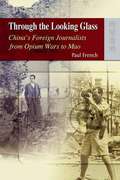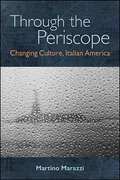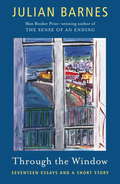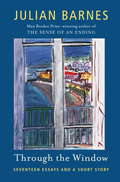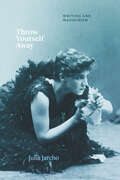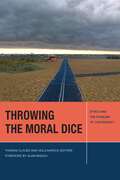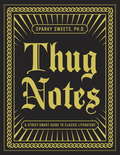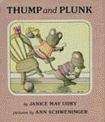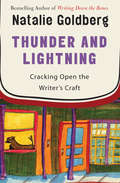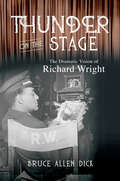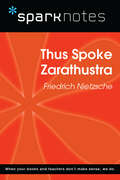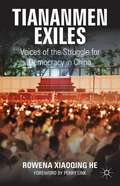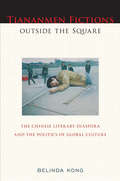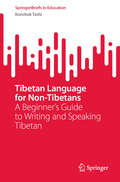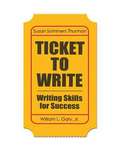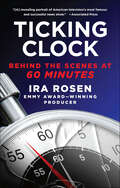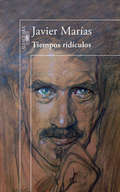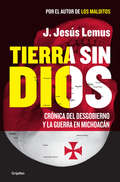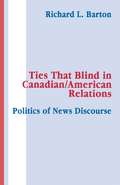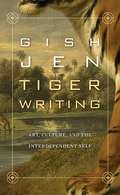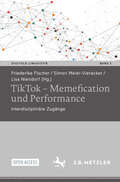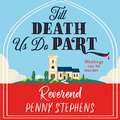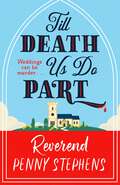- Table View
- List View
Through the Looking Glass
by Paul FrenchThe convulsive history of foreign journalists in China starts with the newspapers printed in the European Factories of Canton in the 1820s and ends with the Communist revolution in 1949. It also starts with a duel between two editors over the China's future and ends with a fistfight in Shanghai over the revolution.
Through the Negative: The Photographic Image and the Written Word in Nineteenth-Century American Literature
by Megan WilliamsThe Civil War was the first 'image war', as photographs of the battlefields became the dominant means for capturing an epochal historical moment. At the same time, writers used the Civil War to present both their notions of nation and their ideas about the new intersections between photography and literary form. Through The Negative offers an accou
Through the Periscope: Changing Culture, Italian America (SUNY series in Italian/American Culture)
by Martino MarazziThe constant dialogue between literary forms of the Old and the New World is the core concern of the essays in Through the Periscope, which examine these ever-changing historical, intellectual, and psychological landscapes through the lens of Italian American culture. Moving beyond Little Italy, the book widens the spectrum of "pure" immigrant studies. It analyzes the longue durée of the revolutionary energies of 1848, an arc that leads from Margaret Fuller to Bob Dylan via the Great Migration of European peoples and languages, as well as the merging of various immigrant voices in the "changing culture" of turn-of-the-century New York. It reclaims the importance of Dante for Italian American writers and follows the metamorphosis of a Romance language dense in masterworks and oral nuances through the multiple signs of a new "illiterature." Points of arrival are both the majestic proletarian novels of the 1930s and a contemporary poem like Robert Viscusi's Ellis Island. Martino Marazzi's volume underlines the richness of such an epic cultural transformation and its fundamental importance for a more thorough understanding of Euro-American relations.
Through the Window
by Julian BarnesFrom the Man Booker Prize-winning author of The Sense of an Ending and one of Britain's greatest writers: a brilliant collection of essays on the books and authors that have meant the most to him throughout his illustrious career. In these seventeen essays (plus a short story and a special preface, "A Life with Books"), Julian Barnes examines the British, French and American writers who have shaped his writing, as well as the cross-currents and overlappings of their different cultures. From the deceptiveness of Penelope Fitzgerald to the directness of Hemingway, from Kipling's view of France to the French view of Kipling, from the many translations of Madame Bovary to the fabulations of Ford Madox Ford, from the National Treasure status of George Orwell to the despair of Michel Houellebecq, Julian Barnes considers what fiction is, and what it can do. As he writes, "Novels tell us the most truth about life: what it is, how we live it, what it might be for, how we enjoy and value it, and how we lose it."
Through the Window: Seventeen Essays and a Short Story (Vintage International)
by Julian BarnesFrom the bestselling, Booker Prize-winning author of The Sense of an Ending and one of Britain&’s greatest writers: a brilliant collection of essays on the books and authors that have meant the most to him throughout his illustrious career. • "[A] blissfully intelligent gathering of literary essays." —Financial Times In these seventeen essays (plus a short story and a special preface, &“A Life with Books&”), Julian Barnes examines the British, French and American writers who have shaped his writing, as well as the cross-currents and overlappings of their different cultures. From the deceptiveness of Penelope Fitzgerald to the directness of Hemingway, from Kipling&’s view of France to the French view of Kipling, from the many translations of Madame Bovary to the fabulations of Ford Madox Ford, from the National Treasure status of George Orwell to the despair of Michel Houellebecq, Julian Barnes considers what fiction is, and what it can do. As he writes, &“Novels tell us the most truth about life: what it is, how we live it, what it might be for, how we enjoy and value it, and how we lose it.&”
Throw Yourself Away: Writing and Masochism (Thinking Literature)
by Julia JarchoProposes that we can best understand literature’s relationship to sex through a renewed focus on masochism. In a series of readings that engage American and European works of fiction, drama, and theory from the late nineteenth through the early twenty-first centuries, critic and playwright Julia Jarcho argues that these works conceive writing itself as masochistic, and masochism as sexuality enacted in writing. Throw Yourself Away is distinctive in its sustained focus on masochism as an engine of literary production across multiple authors and genres. In particular, Jarcho shows that theater has played a central role in modern erotic fantasies of the literary. Jarcho foregrounds writing as a project of distressed subjects: When masochistic writing is examined as a strategy of response to injurious social systems, it yields a surprisingly feminized—and less uniformly white—image of both masochism and authorship. Ultimately, Jarcho argues that a retheorized concept of masochism helps us understand literature itself as a sex act and shows us how writing can tend to our burdened, desirous bodies. With startling insights into such writers as Henry James, Henrik Ibsen, Mary Gaitskill, and Adrienne Kennedy, Throw Yourself Away furnishes a new masochistic theory of literature itself.
Throwing the Moral Dice: Ethics and the Problem of Contingency (Just Ideas)
by Thomas Claviez and Viola MarchiMore than a purely philosophical problem, straddling the ambivalent terrain between necessity and impossibility, contingency has become the very horizon of everyday life. Often used as a synonym for the precariousness of working conditions under neoliberalism, for the unknown threats posed by terrorism, or for the uncertain future of the planet itself, contingency needs to be calculated and controlled in the name of the protection of life. The overcoming of contingency is not only called upon to justify questionable mechanisms of political control; it serves as a central legitimating factor for Enlightenment itself. In this volume, nine major philosophers and theorists address a range of questions around contingency and moral philosophy. How can we rethink contingency in its creative aspects, outside the dominant rhetoric of risk and dangerous exposure? What is the status of contingency—as the unnecessary and law-defying—in or for ethics? What would an alternative “ethics of contingency”—one that does not simply attempt to sublate it out of existence—look like?The volume tackles the problem contingency has always posed to both ethical theory and dialectics: that of difference itself, in the difficult mediation between the particular and the universal, same and other, the contingent singularity of the event and the necessary generality of the norms and laws.From deconstruction to feminism to ecological thought, some of today’s most influential thinkers reshape many of the most debated concepts in moral philosophy: difference, agency, community, and life itself.Contributors: Étienne Balibar, Rosi Braidotti, Thomas Claviez, Drucilla Cornell, Hans Ulrich Gumbrecht, Viola Marchi, Michael Naas, Cary Wolfe, Slavoj Žižek
Thug Notes
by Sparky SweetsSparky Sweets, PhD. and Wisecrack proudly present this outrageously funny, ultra-sharp guide to literature based on the hit online series, Thug Notes. Inside, you'll find hilarious plot breakdowns and masterful analyses of sixteen of literature's most beloved classics, including: The Catcher in the Rye, To Kill A Mockingbird, Pride & Prejudice, The Color Purple, Hamlet, Things Fall Apart, and more! Thug Notes has been featured on BET, PBS, and NPR and has been used in hundreds of classrooms around the world. Whether you're a student, teacher, or straight-up literary gangster like Dr. Sweets, Thug Notes has got you covered. You'll certainly never look at literature the same way again.
Thump and Plunk
by Janice May UdryWhen Thump thumps Plunk's doll Plunkit, an argument starts which their mother resolves.
Thunder and Lightning: Cracking Open the Writer's Craft
by Natalie GoldbergGuidance on how to turn those flashes of inspiration into finished pieces, from the author of Writing Down the Bones and Wild Mind. Any writer may find himself or herself with an abundance of raw material, but it takes patience and care to turn this material into finished stories, essays, poems, novels, and memoirs. Referencing her own experiences both as a writer and as a student of Zen, Natalie provides insight into the struggles and demands of turning ideas into concrete form. Her guidance addresses ways to overcome writer&’s block, deal with the fear of criticism and rejection, get the most from working with an editor, and improve one&’s writing by reading accomplished authors. She communicates this with her characteristic humor and compassion, and a deep respect for writing as an act of celebration. This ebook features an illustrated biography of Natalie Goldberg, including rare photos and never-before-seen documents from the author&’s personal collection.
Thunder on the Stage: The Dramatic Vision of Richard Wright
by Bruce Allen DickRichard Wright’s dramatic imagination guided the creation of his masterpieces Native Son and Black Boy and helped shape Wright’s long-overlooked writing for theater and other performative mediums. Drawing on decades of research and interviews with Wright’s family and Wright scholars, Bruce Allen Dick uncovers the theatrical influence on Wright’s oeuvre--from his 1930s boxing journalism to his unpublished one-acts on returning Black GIs in WWII to his unproduced pageant honoring Vladimir Lenin. Wright maintained rewarding associations with playwrights, writers, and actors such as Langston Hughes, Theodore Ward, Paul Robeson, and Lillian Hellman, and took particular inspiration from French literary figures like Jean-Paul Sartre. Dick’s analysis also illuminates Wright’s direct involvement with theater and film, including the performative aspects of his travel writings; the Orson Welles-directed Native Son on Broadway; his acting debut in Native Son’s first film version; and his play “Daddy Goodness,” a satire of religious charlatans like Father Divine, in the 1930s. Bold and original, Thunder on the Stage offers a groundbreaking reinterpretation of a major American writer.
Thus Spoke Zarathustra (SparkNotes Philosophy Guide)
by SparkNotesThus Spoke Zarathustra (SparkNotes Philosophy Guide) Making the reading experience fun! SparkNotes Philosophy Guides are one-stop guides to the great works of philosophy–masterpieces that stand at the foundations of Western thought. Inside each Philosophy Guide you&’ll find insightful overviews of great philosophical works of the Western world.
Tiananmen Exiles
by Rowena Xiaoqing HeIn the spring of 1989, millions of citizens across China took to the streets in a nationwide uprising against government corruption and authoritarian rule. What began with widespread hope for political reform ended with the People's Liberation Army firing on unarmed citizens in the capital city of Beijing, and those leaders who survived the crackdown became wanted criminals overnight. Among the witnesses to this unprecedented popular movement was Rowena Xiaoqing He, who would later join former student leaders and other exiles in North America, where she has worked tirelessly for over a decade to keep the memory of the Tiananmen Movement alive. This moving oral history interweaves He's own experiences with the accounts of three student leaders exiled from China. Here, in their own words, they describe their childhoods during Mao's Cultural Revolution, their political activism, the bitter disappointments of 1989, and the profound contradictions and challenges they face as exiles. Variously labeled as heroes, victims, and traitors in the years after Tiananmen, these individuals tell difficult stories of thwarted ideals and disconnection, but that nonetheless embody the hope for a freer China and a more just world.
Tiananmen Fictions outside the Square: The Chinese Literary Diaspora and the Politics of Global Culture (Asian American History & Cultu #187)
by Belinda KongAn exciting analysis of the myriad literary effects of Tiananmen, Belinda Kong's Tiananmen Fictions Outside the Square is the first full-length study of fictions related to the 1989 movement and massacre. More than any other episode in recent world history, Tiananmen has brought a distinctly politicized Chinese literary diaspora into stark relief. Kong redefines Tiananmen's meaning from an event that ended in local political failure to one that succeeded in producing a vital dimension of contemporary transnational writing today. She spotlights key writers-Gao Xingjian, Ha Jin, Annie Wang, and Ma Jian-who have written and published about the massacre from abroad. Their outsider/distanced perspectives inform their work, and reveal how diaspora writers continually reimagine Tiananmen's relevance to the post-1989 world at large. Compelling us to think about how Chinese culture, identity, and politics are being defined in the diaspora, Tiananmen Fictions Outside the Square candidly addresses issues of political exile, historical trauma, global capital, and state biopower.
Tibetan Calligraphy
by Sarah Harding Sanje ElliottIn Tibetan Calligraphy, Sanje Elliott shows us how to capture the elegance and grace of Tibetan calligraphy without prior knowledge of either Tibetan language or calligraphy. This beautiful book includes many prayers, mantras, and seed syllables to copy and study. Perfect for practitioners, artists, and anyone interested in the Tibetan language.
Tibetan Language for Non-Tibetans: A Beginner's Guide to Writing and Speaking Tibetan (SpringerBriefs in Education)
by Konchok TashiThis book serves as a practical guidebook for non-Tibetan beginners who want to learn the Tibetan writing system and conversational Tibetan, but have never studied the language before. Based on modern colloquial Tibetan, it is founded on traditional Tibetan expression as well as the proper shape and style used by Tibetans in their daily lives, enabling learners to connect directly with Tibetans. This book is an outcome of the author’s in-depth research on Tibetan language for the last two and half decades and is the third book in the series of his research work devoted to the ‘Linguistic Studies of the lesser-known/endangered Languages of Indian Himalayas & beyond’. This book features a Foreword from His Holiness the 14th Dalai Lama.
Ticket to Write: Writing Skills for Success
by Susan Sommers Thurman William L. GaryTicket to Write, a cutting-edge developmental writing textbook, focuses on contemporary media and issues that stimulate student learning, covers paragraph and essay development simultaneously, and employs a "solutions approach" to grammar.
Ticking Clock: Behind the Scenes at 60 Minutes
by Ira RosenTwo-time Peabody Award-winning writer and producer Ira Rosen reveals the intimate, untold stories of his decades at America’s most iconic news show. It’s a 60 Minutes story on 60 Minutes itself. When producer Ira Rosen walked into the 60 Minutes offices in June 1980, he knew he was about to enter television history. His career catapulted him to the heights of TV journalism, breaking some of the most important stories in TV news. But behind the scenes was a war room of clashing producers, anchors, and the most formidable 60 Minutes figure: legendary correspondent Mike Wallace.Based on decades of access and experience, Ira Rosen takes readers behind closed doors to offer an incisive look at the show that invented TV investigative journalism. With surprising humor, charm, and an eye for colorful detail, Rosen delivers an authoritative account of the unforgettable personalities that battled for prestige, credit, and the desire to scoop everyone else in the game. As one of Mike Wallace’s top producers, Rosen reveals the interview secrets that made Wallace’s work legendary, and the flaring temper that made him infamous. Later, as senior producer of ABC News Primetime Live and 20/20, Rosen exposes the competitive environment among famous colleagues like Diane Sawyer and Barbara Walters, and the power plays between correspondents Chris Wallace, Anderson Cooper, and Chris Cuomo. A master class in how TV news is made, Rosen shows readers how 60 Minutes puts together a story when sources are explosive, unreliable, and even dangerous. From unearthing shocking revelations from inside the Trump White House, to an outrageous proposition from Ghislaine Maxwell, to interviewing gangsters Joe Bonanno and John Gotti Jr., Ira Rosen was behind the scenes of some of 60 Minutes' most sensational stories.Highly entertaining, dishy, and unforgettable, Ticking Clock is a never-before-told account of the most successful news show in American history.
Tiempos ridículos
by Javier MaríasCon las noventa y seis columnas de este volumen, aparecidas en El País Semanal entre febrero de 2011 y febrero de 2013, Javier Marías cumple diez años de colaboración dominical en este medio. Durante este tiempo se ha convertido en alguien fundamental para infinidad de lectores, que aguardan con impaciencia su dosis semanal de valentía, originalidad, argumentaciones sólidas, sentido del humor y excelente prosa. El periodo aquí cubierto es el de la actual crisis económica y política, por lo que su tono es quizá más amargo que en otras ocasiones. Pero en sus artículos también hay lo que el autor llama «treguas», de modo que el lector encontrará piezas emotivas o divertidas y siempre agudas: sobre la muerte de su tío, el músico Odón Alonso, o el caso Strauss-Kahn, o la nueva Ortografía de la RAE, sobre cómo Mourinho lo ha llevado a ser menos madridista que nunca, o los premios literarios, o sus peripecias en una adusta librería de Viena, o los héroes de los tebeos de su infancia, o la conmovedora carta de un lector... Sin duda Tiempos ridículos enviará a la papelera muchos recortes, porque eso es lo que muchos lectores hacen con las columnas de Javier Marías: las recortan y las guardan, para darse ánimos al releerlas y renovar el placer. «Sí, vivimos tiempos ridículos. Lo peor es que en España la mayoría de la gente se siente en ellos como pez en el agua.» Javier Marías
Tierra sin Dios: Crónica del desgobierno y la guerra en Michoacán
by J. Jesús LemusUna intensa crónica periodística que aborda los acontecimientos históricos que dieron origen al estado fallido en que se convirtió Michoacán en los últimos años. Tras la publicación de Los malditos, Jesús Lemus ha adquirido gran reconocimiento como autoridad en la investigación sobre los orígenes de la problemática que abruma a Michoacán. Con riguroso sentido periodístico, Tierra sin Dios hace un recuento de los hechos más importantes ocurridos en este estado, a fin de poder entender su actual situación de desgobierno. Éste es el resultado de un intenso quehacer periodístico de Jesús Lemus, quien se aproxima a fenómenos sociales en Michoacán tan relevantes en los últimos años como el surgimiento de los grupos de autodefensas y la abrasadora presencia del crimen organizado. He aquí la visión más cercana de la violencia, el abandono del gobierno estatal, la impunidad y la corrupción oficiales en los que se encuentra sumida la población del estado. Tierra sin Dios es una visión distinta, e incluso opuesta, a la cobertura otorgada al caso de Michoacán por algunos medios informativos de corte nacional e internacional. Un libro que comienza con un breve recorrido de los últimos diez gobiernos estatales, y que aborda con puntualidad tanto el debilitamiento de las instituciones, como el asalto al poder por parte de los cárteles de la droga.
Ties That Blind in Canadian/american Relations: The Politics of News Discourse (Routledge Communication Series)
by Richard L. BartonThis volume explores the political impact of journalistic discourse on international -- and especially Canadian/American -- relations. In so doing, it provides a comparative analysis of American and international press accounts of selected Canadian/American issues such as free trade, cruise missile testing, and acid rain. The intention of the book is to enhance understanding of the political significance of journalists' interpretations of Canadian/American affairs, although the communication perspective and method of news analysis of the book are appropriate for the study of the United States' news-mediated relations with other countries. This study also examines the way people negotiate news-mediated political discourse and how that communication process can influence international affairs.
Tiger Writing: Art, Culture, And The Interdependent Self (The William E. Massey Sr. Lectures In The History Of American Civilization Ser. #2012)
by Gish JenFor author Gish Jen, the daughter of Chinese immigrant parents, books were once an Outsiders’ Guide to the Universe. But they were something more, too. Through her eclectic childhood reading, Jen stumbled onto a cultural phenomenon that would fuel her writing for decades to come: the profound difference in self-narration that underlies the gap often perceived between East and West. <P><P>Drawing on a rich array of sources, from paintings to behavioral studies to her father’s striking account of his childhood in China, this accessible book not only illuminates Jen’s own development and celebrated work but also explores the aesthetic and psychic roots of the independent and interdependent self—each mode of selfhood yielding a distinct way of observing, remembering, and narrating the world. The novel, Jen writes, is fundamentally a Western form that values originality, authenticity, and the truth of individual experience. <P><P>By contrast, Eastern narrative emphasizes morality, cultural continuity, the everyday, the recurrent. In its progress from a moving evocation of one writer’s life to a convincing delineation of the forces that have shaped our experience for millennia, Tiger Writing radically shifts the way we understand ourselves and our art-making.
TikTok – Memefication und Performance: Interdisziplinäre Zugänge (Digitale Linguistik #2)
by Simon Meier-Vieracker Friederike Fischer Lisa NiendorfGegenstand des interdisziplinären Open-Access-Bandes ist die Videoplattform TikTok, die als eines der meistgenutzten Sozialen Netzwerke große gesellschaftliche Relevanz entfalten konnte und insbesondere in (außer-)schulischen Bildungsbereichen eine zunehmend wichtige Rolle spielt. Nach anfänglichem Alarmismus einerseits und Marginalisierung als reines Spaßmedium andererseits wird TikTok insbesondere in internationalen Forschungskontexten längst als kulturwissenschaftlicher Gegenstand ernst genommen. Die auf TikTok zu beobachtenden kommunikativen Praktiken und Genres, in denen aktuelle Ereignisse und Diskurse in plattformtypischer Weise verhandelt und performativ in Szene gesetzt werden, führen stärker noch als andere Soziale Medien die Zeichenmodalitäten Bild, Ton und Sprache zusammen und eröffnen dadurch neue Optionen der Vermittlung, der diskursiven Aneignung und der sozialen Repräsentation. Die grundlegenden Affordanzen der Plattform, insbesondere die Möglichkeit, zu bestehenden Sounds neue Videos zu produzieren, begünstigen dabei einen stark von Intertextualität, Intermedialität und Imitation geprägten Modus von Inszenierung und Performance, der im Anschluss an neuere Forschungen zu digitalen (Bild-)Praktiken als Memefication bezeichnet werden kann. Der Band fragt deshalb danach, wie sich das multimodale Mediensetting von TikTok im Spannungsfeld von Memefication und Performance zu einer charakteristischen Form vernetzter Öffentlichkeit ausgestaltet und welche Vermittlungsoptionen in verschiedenen Praxisfeldern sich hierbei ergeben. Dafür werden unterschiedliche wissenschaftliche Perspektiven gebündelt, welche die Videoplattform als empirischen Untersuchungsgegenstand erschließen und hierfür geeignete theoretische Konzepte und methodische Zugänge entwickeln. Inhaltlich umfasst der Band Beiträge aus den Sprach-, Kommunikations- und Medienwissenschaften, der Film- und Musikwissenschaft, der Ingenieurswissenschaft sowie didaktischen und erziehungswissenschaftlichen Disziplinen,die in drei Teilen miteinander in Bezug gesetzt werden: Neben TikTok-spezifischen digitalen Praktiken gilt das Interesse dem Status der Plattform in Vermittlungs- und Bildungskontexten sowie in der Wissenschaftskommunikation.
Till Death Us Do Part
by Penny Stephens'A new star in the crime-writing firmament' Elly GriffthsThe charming and delightfully cosy debut crime novel from Reverend Penny Stephens.Weddings can be murder . . .Reverend Clare Brakespear is used to a challenge. With a young family to wrangle, a parish to manage and a particularly excitable Golden Retriever by her side, life is never dull. But when she attends a wedding where one of the guests is fatally stabbed with a cake knife, even Clare admits that she might have been given too much to handle this time.As the police investigate the murder, they zero-in on one woman as their prime suspect, who they believe had the motive, means and opportunity to commit the crime. The trouble is, Clare is convinced that they have the wrong person. She might not understand forensic testing and finger-tip searches, but if there's one thing Clare does know, it's people and the complexities of their emotional lives. So she decides to take matters into her own hands. However, investigating a murder is no mean feat and Clare soon finds herself embroiled in a complex web of family secrets and deceptions. Is she in way over her head or can she find the real killer before an innocent woman is sent down?
Till Death Us Do Part: a charming and delightfully cosy mystery that will keep you hooked!
by Penny Stephens'A new star in the crime-writing firmament' Elly GriffthsThe charming and delightfully cosy debut crime novel from Reverend Penny Stephens.Weddings can be murder . . .Reverend Clare Brakespear is used to a challenge. With a young family to wrangle, a parish to manage and a particularly excitable Golden Retriever by her side, life is never dull. But when she attends a wedding where one of the guests is fatally stabbed with a cake knife, even Clare admits that she might have been given too much to handle this time.As the police investigate the murder, they zero-in on one woman as their prime suspect, who they believe had the motive, means and opportunity to commit the crime. The trouble is, Clare is convinced that they have the wrong person. She might not understand forensic testing and finger-tip searches, but if there's one thing Clare does know, it's people and the complexities of their emotional lives. So she decides to take matters into her own hands. However, investigating a murder is no mean feat and Clare soon finds herself embroiled in a complex web of family secrets and deceptions. Is she in way over her head or can she find the real killer before an innocent woman is sent down?
